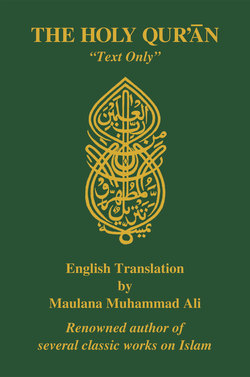Читать книгу The Holy Quran, English Translation, âText Onlyâ - Maulana Muhammad Ali - Страница 114
На сайте Литреса книга снята с продажи.
Chapter 6 Al-An‘am: The Cattle
Оглавление(Revealed at Makkah: 20 sections; 165 verses)
The name of this chapter is taken from the mention of cattle in connection with certain superstitions and idolatrous practices of the Arabs, the abolition of which was needed to establish the doctrine of Divine Unity in all its purity. The object of Islam was not simply to preach Unity, but to make it the basis of a Muslim’s practical life, and so to uproot all idolatrous practices.
The last chapter deals towards its close with the Christian doctrine of the deification of Jesus, and hence this chapter is introduced to deal at length with the doctrine of Divine Unity and its ultimate triumph, not only over idolatry, but over all kinds of polytheism. The Prophet had preached this noble doctrine for twelve whole years, without apparently causing any great change in the national idol-worship of the people. To an outward observer, therefore, the cause of the Prophet seemed an utter failure, yet so marvellous was his faith in the ultimate triumph of Divine Unity that no obstacle, no apparent failure, had shaken it in the least, and the words with which this chapter opens were uttered with unshakable confidence in the ultimate triumph of his cause, as if he had never received the least check in his onward course, and as though the goal was not only within sight, but close at hand.
Opening with a forcible declaration of the ultimate triumph of Divine Unity, and referring to the greatness of His mercy in the second section, the doctrine of Unity being always combined with the doctrine of the unique mercy of the Diving Being, it refers in the third to the polytheists’ own evidence against their polytheism. The rejection of this great truth and its consequences are then stated in the fourth and fifth sections, mentioning incidentally the reward of believers in the sixth section. In the two succeeding sections the Divine judgment is declared to be imminent. The ninth, while calling attention to the necessity of submission to the Divine Being — the pith of Abraham’s religion — mentions the arguments by which Abraham, that great Patriarch who may be said to be the father of monotheism, convinced his countrymen of the futility of the worship of any object other than Allah. The tenth section mentions the names of seventeen other prophets who preached the Unity of the Divine Being, and the Holy Prophet is enjoined to follow in their footsteps. The eleventh section draws attention to the truth of the Divine revelation of the Qur’an, which was now the bearer of that noble message of Divine Unity to mankind, and the next speaks of the ultimate triumph of that message. The thirteenth section states that this triumph would be brought about by a gradual progress, and the fourteenth refers to the polytheists’ opposition. The plans adopted by the chief opponents are then hinted at in the fifteenth, and their failure prophesied in the sixteenth section, which deals with some of the evils of idolatry. The next two refer to the polytheists’ self-imposed superstitious restrictions against the use of the flesh of certain animals, and the prohibited foods. The guiding rules of life are then briefly stated in the nineteenth section, while the chapter is closed by drawing attention to the great goal before the faithful; because, undoubtedly, the doctrine of Unity raised the ideal of human life to a very high standard.
The whole of this chapter was revealed in one portion (I‘Ab-Rz). It is generally considered to belong to the last year of the Holy Prophet’s life at Makkah.
